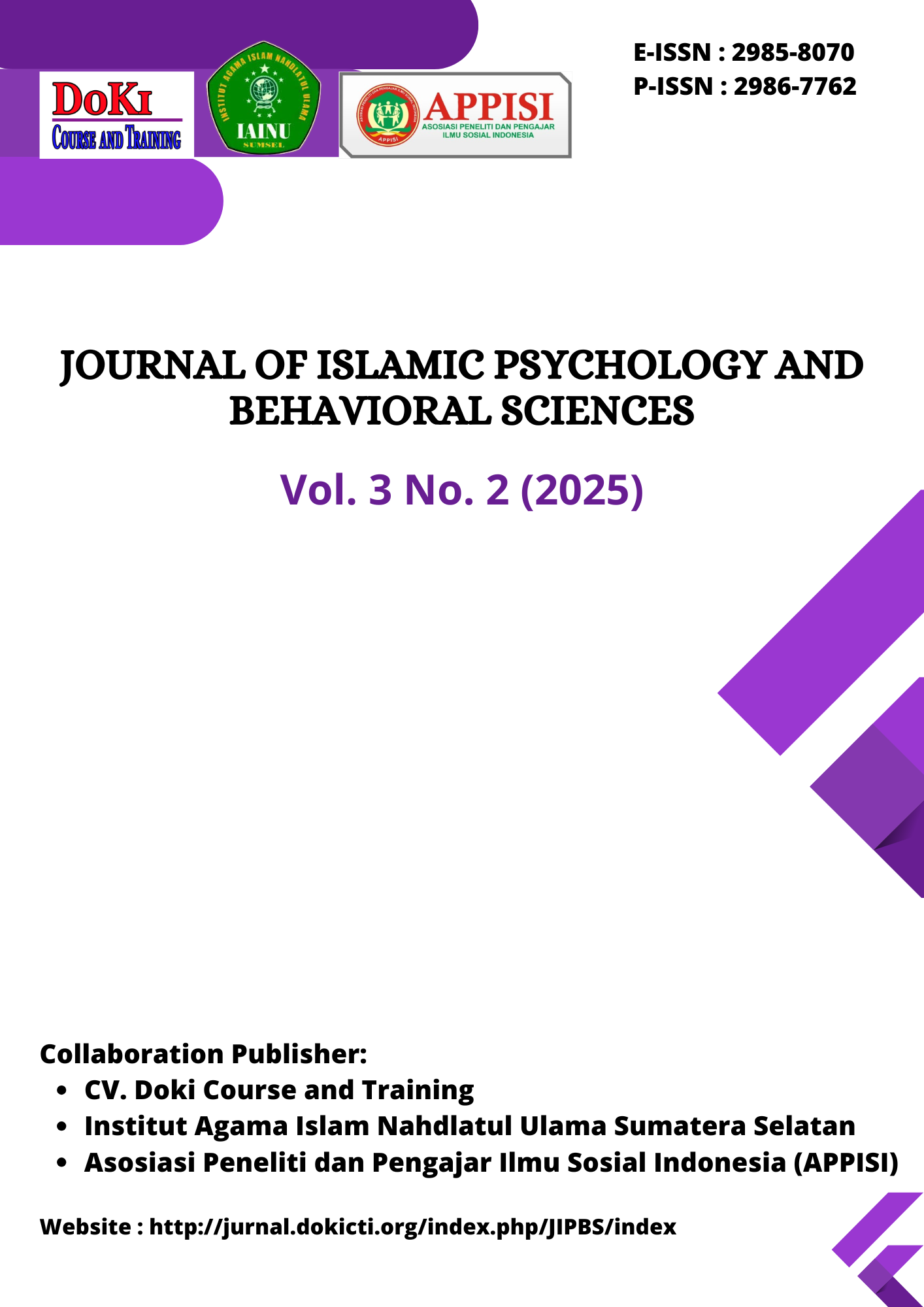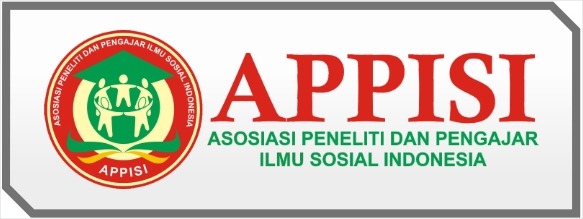The Effect of Cognitive Behavioral Therapy through Recitation and Prayer on Reducing Smartphone Addiction In College Students
DOI:
https://doi.org/10.61994/jipbs.v3i2.295Keywords:
Prayer, Smartphone Addiction, Qur'anAbstract
The purpose of the research we conducted was to determine the effect of Cognitive behavioral therapy through mngengaji and prayer on reducing smartphone addiction in students of the Faculty of Psychology, Raden Fatah State Islamic University Palembang. The research we conducted used the One-Group Pretest-Posttest Design pre-experiment design method. The results of the research and conclusions are that there is a very significant difference in smartphone addiction in students in the dimension of Disrupting Daily Life decreased from the pretest percentage score of 80% to the posttest percentage score of 41% with an N-Gain value of 0.38. Then the Positive Anticipation dimension decreased from the pretest percentage score of 72% to the posttest percentage score of 58% with an N-Gain value of 1.00. Then the Withdrawal dimension decreased from the pretest percentage score of 54% to the posttest percentage score of 46% with an N-Gain value of 0.09. Then the Cyberspace-Oriented Relationship dimension decreased from the pretest percentage score of 63% to the posttest percentage score of 50% with an N-Gain value of 0.22. Then the Excessive Use dimension decreased from the pretest percentage score of 71% to the posttest percentage score of 46% with an N-Gain value of 0.41. Finally, the Tolerance dimension decreased from the pretest percentage score of 72% to the posttest percentage score of 47% with an N-Gain value of 0.06.
References
Apsari, T. N. (2019). COGNITIVE BEHAVIOR THERAPY MELALUI SHOLAT DAN MEMBACA AL-QUR’AN DALAM MENGATASI KECANDUAN GAWAI PADA REMAJA DI DRIYOREJO GRESIK. UNIVERSITAS ISLAM NEGERI SUNAN AMPEL SURABAYA.
Amna, Z., Faradina, S., & Mufidah, R. (2020). Gambaran kecenderungan adiksi penggunaan ponsel cerdas pada mahasiswa. Seurune: Jurnal Psikologi Unsyiah, 3(2), 101-112.Cozby, P. C., & Bates, S. C. (2015). Methods in Behavioral Research. McGraw-Hill Education.
Asih, A. T., & Fauziah, N. (2017). Hubungan antara kontrol diri dengan kecemasan jauh dari smartphone (nomophobia) pada mahasiswa jurusan ilmu komunikasi fakultas ilmu sosial dan politik Universitas Diponegoro Semarang. Jurnal empati, 6(2), 15-20.
Asih, A. T., & Fauziah, N. (2017b). Hubungan antara Kontrol Diri dengan Kecemasan Jauh dari Smartphone (Nomophobia) pada Mahasiswa Jurusan Ilmu Komunikasi Fakultas Ilmu Sosial dan Politik Universitas Diponegoro Semarang. Jurnal Empati, 6(2), 15–20.
Aswar, A., & Erviana, E. (2020). Hubungan smartphone dengan kualitas tidur remaja di SMA Negeri 2 Majene. Journal of Islamic Nursing, 5(2), 95-100.
Azizah, M., & Muslikah, M. (2021). Hubungan antara manajemen waktu dan regulasi diri dengan kecanduan smartphone. Jurnal Ilmiah Bimbingan Konseling Undiksha, 12(1).
Bakri, R. P. (2021). Pengaruh stres akademik dan kecanduan smartphone terhadap prokrastinasi akademik. Psikoborneo: Jurnal Ilmiah Psikologi, 9(3), 578-593.
Creswell, J. W. (2012). Educational research: Planning, conducting, and evaluating quantitative and qualitative research. Educational Research, 4. https://doi.org/https://doi.org/10.1017/CBO9781107415324.004
Creswell, J. W. (2014). Research design : qualitative, quantitative, and mixed methods approaches (4th Edition). Sage Publication.
Firdaus, W., & Marsudi, M. S. (2021). Konseling remaja yang kecanduan gadget melalui terapi kognitif behavior. Studia: Jurnal Hasil Penelitian Mahasiswa, 6(1), 15-24.
Hafizah, N., Adriansyah, M. A., & Permatasari, R. F. (2021). Kontrol Diri dan Komunikasi Interpersonal Terhadap Perilaku Phubbing. Psikoborneo: Jurnal Ilmiah Psikologi, 9(3), 630-645.
Helni, A., & Hidayat, B. (2021). SOLUSI GANGGUAN SMARTPHONE ADDICTION BERDASARKAN PENDEKATAN PSIKOLOGI ISLAM. Al-Hikmah: Jurnal Agama Dan Ilmu Pengetahuan, 18(1).
Kurniawan, I. G. Y., Rustika, I. M., & Aryani, L. N. A. (2016). Uji validitas dan reliabilitas modifikasi smartphone addiction scale versi Bahasa Indonesia. MEDICINA , 47(3).
Kwon, M., Kim, D. J., Cho, H., & Yang, S. (2013). The adiksi smartphone: development and validation of a short version for adolescents (SAS-SV). Plos One, 8(12).
Kwon, M., Lee, J. Y., Won, W. Y., Park, J. W., Min, J. A., Hanh, C., Gu, X. ., Choi, J. H., & Kim, D. J. (2013). Development and validation of smartphone adiksi scale (SAS). Plos One, 8(2).
Mumtaz, E. F. (2019). Pengaruh adiksi smartphone, empati, kontrol diri, dan norma terhadap perilaku phubbing pada mahasiswa di Jabodetabek (Bachelor’s thesis, Fakultas Psikologi UIN Syarif Hidayatullah Jakarta).
Musa, Z. (2015). Pengaruh keterampilan sosial dan kesepian terhadap kecenderungan adiksi internet pada remaja pengguna smartphone (Bachelor’s thesis, UIN Syarif Hidayatullah Jakarta: Fakultas Psikologi, 2015xiv, 80 hlm.; 29 cm.).
Palupi, D. A., Sarjana AS, W., & Hadiati, T. (2018). Hubungan Ketergantungan Smartphone Terhadap Kecemasan Pada Mahasiswa Fakultas Kedokteran Universitas Diponegoro (Doctoral dissertation, Faculty of Medicine).
Rumapea, A., Sinurat, S., & Barus, M. (2023). Hubungan Self Control dengan Adiksi Smartphone pada Mahasiswa. Jurnal Ilmiah Permas: Jurnal Ilmiah STIKES Kendal, 13(3), 879-886.
Rofiah, H., Ratnasari, D., & Tobing, C. M. H. (2023). Konseling kelompok dengan teknik cognitive behavior therapy untuk meningkatkan kontrol diri dalam penggunaan smartphone. Orien: Cakrawala Ilmiah Mahasiswa, 2(3), 175-180.
Downloads
Published
Issue
Section
License
Copyright (c) 2025 Salsabila Nur Kamilah, Ahmad Arfandi , Muhammad Iqbal Alhadii

This work is licensed under a Creative Commons Attribution-ShareAlike 4.0 International License.

Journal of Islamic Psychology and Behavioral Sciences by https://jurnal.dokicti.org/index.php/JIPBS/index
is licensed under a Creative Commons Attribution-ShareAlike 4.0 International Licensel














